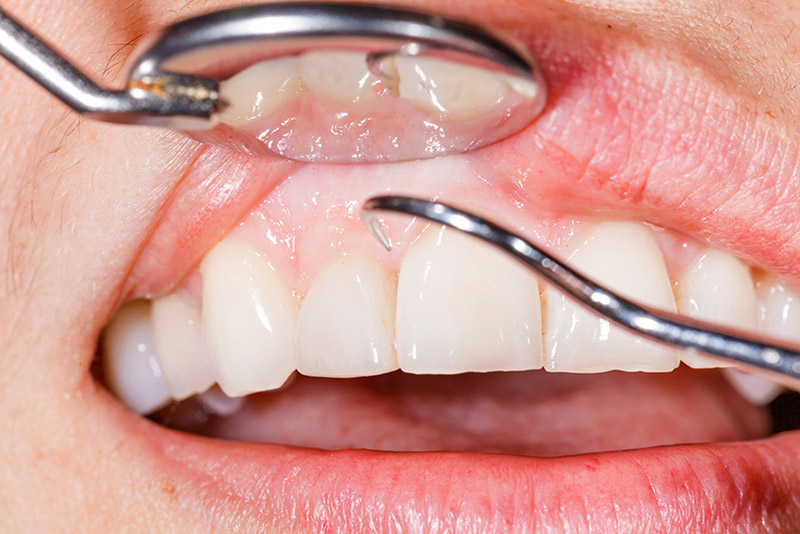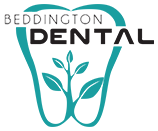Gum Disease Near You
If your gums are red, swollen, or bleed when you brush your teeth, you may have a condition called periodontal gum disease. At Beddington Dental Clinic, we help people treat and manage gum disease in Calgary in a simple, comfortable, and professional way.

What Is Gum Disease?
Gum disease near you is a disease of the gum tissues that keep your teeth in place. It most often begins with plaque, a sticky layer of bacteria that forms on teeth. When plaque is not brushed away, it will harden and become tartar. Tartar cannot be removed through brushing. It can be removed only by a dentist. Over time, bacteria can make your gums recede from your teeth. This can result in loose teeth or tooth loss if left untreated.
What Causes Periodontal Disease?
There are several reasons why gum disease can happen. These include:
- Poor oral hygiene
- Smoking or using tobacco
- Diabetes
- Stress
- Hormonal changes (like during pregnancy)
- Certain medications
- Family history of gum disease
Signs You May Have Gum Disease
You may not have pain at first. That’s why you should know the signs, like:
- Bleeding gums when you brush or floss
- Gums that are red or swollen
- Persistent bad breath
- Receding gums (gums that appear to be pulling away from your teeth)
- Loose teeth or differences in how your teeth fit together
If you experience any of these symptoms, come see us at Beddington Dental Clinic at your earliest convenience.
Why Treating Gum Disease Matters?
Periodontal disease, if not treated, can cause more severe health issues. It can also hurt the bone that supports your teeth. Gum disease in Calgary has also been associated with conditions such as heart disease, diabetes, and breathing issues. Therefore, early treatment is crucial.
Gum Disease Treatment
At Beddington Dental Clinic, we offer gentle and professional care to treat gum disease in Calgary. Our dentists use simple but effective methods to clean your teeth and gums. We focus on removing plaque and tartar that cause infection. Our team also checks your gum health and teaches you how to care for your mouth at home. With regular visits and proper care, we help protect your teeth and gums from future problems.
Here are the three common types of gum tissue grafts your dentist may use, depending on your needs:
- Connective-Tissue Grafts: This is the most common type. Our dentist will make a small flap in the roof of your mouth (called the palate) and take tissue from under that flap. This tissue is then stitched to the gums around the exposed tooth root. After taking the tissue, the flap is stitched back in place.
- Free Gingival Grafts: In this method, our dentist removes a small piece of tissue directly from the roof of your mouth. This tissue is placed on the area where your gums are thin or missing. This helps make the gums stronger and thicker.
- Pedicle Grafts: If you have enough gum tissue near the problem area, our dentist will use this type. Instead of taking tissue from the palate, a flap of gum near the tooth is partially cut and pulled over the exposed root. The gum flap is then sewn into place.
Sometimes, dentists may use special graft material from a tissue bank or apply proteins to help your body grow new tissue. Our dentist will talk with you about the option for your treatment.
Recovery From Gum Tissue Graft
After your gum tissue graft, you can go home the same day. If you had a sedative, someone should drive you. Our dentist in Calgary will give you instructions about eating soft foods like yogurt and pasta, and how to keep your mouth clean without brushing the graft area. You might feel some soreness, especially if tissue was taken from the roof of your mouth, but medicine can help. Most people return to normal activities the next day.
How to Prevent Gum Disease?
Good oral hygiene at home and regular dental visits are the ways to prevent gum disease near you. Here are some simple tips:
- Brush your teeth twice a day with a soft-bristle toothbrush
- Use fluoride toothpaste
- Floss every day to clean between your teeth
- Visit the dentist every 6 months for cleanings and exams
- Eat healthy foods and avoid too much sugar
- Don’t smoke—smoking increases the risk of gum disease
Why Choose Beddington Dental Clinic?
At Beddington Dental Clinic, we care about your smile and your overall health. Our friendly dentist near you is here to help you feel at ease. We take time to explain every step, so you understand your treatment and feel comfortable.
When you choose us for gum disease treatment, you get:
- Personalized care based on your needs
- A clean and comfortable environment
- Modern dental tools and gentle techniques
- Friendly dental professionals who listen and care
Get Gum Disease Treatment at Beddington Dental Clinic!
If you think you might have gum disease or just want to keep your mouth healthy, we’re here to help. Don’t wait until it gets worse. Gum disease near you can be treated—and even reversed in early stages—with the right care.
Call Beddington Dental Clinic today to book your appointment. Let us help you protect your smile for life.
📍 Find us easily on the Google map and plan your visit today!
